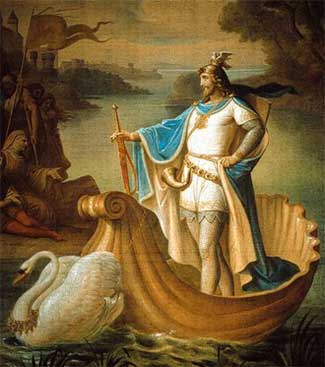I recently had a passing encounter with Wagner’s opera Lohengrin, and I am still reeling from the ridiculousness. Fortunately it was only a passing encounter – the full opera runs just under four hours, and that’s not even counting the two intervals wherein you stagger forth to refresh your bewildered brain with an icecream.
Side Note: where English is stuck with the rather vague “full-length” to describe theatrical presentations, the Germans have the nifty word abendfüllend, meaning something that fills the evening. Wagner I imagine must have his own word: abendüberfüllend.
The story of Lohengrin goes like this. The child-Duke of Brabant has disappeared. His guardian the Count accuses the wee Duke’s big sister Elsa of murdering the poor boy in order to become Duchess of Brabant herself. He furthermore suggests that the visiting King should make him Duke of Brabant instead, thus foiling the murderess’s ambitions. (If you are feeling suspicious of the Count right now, fair enough.)
The King decides this is above his pay grade and refers the matter to God – by means of Trial By Combat. Of course, no one expects Elsa to fight for herself, being of the female persuasion, so the call goes out for volunteers. Big resounding silence, followed by a second big resounding silence at the second time of asking.
Elsa prays that God would send her a champion (a more intelligent woman might have prayed for her brother to be restored to life, or for his murderer to drop dead, but here we are) and nek minnit, here comes a boat pulled by a swan. Yes, a swan. Some people use oars, some people have even mastered the concept of the sail, but this is Wagner, so the mystical boat’s propulsion is one swanpower.
Said boat contains one (1) Knight in Shining Armour, who asks Elsa if she will let him be her champion and also marry him. As public marriage proposals go, this is a doozy. Wilt thou be mine? Or wouldst thou rather be executed for a murder thou didst not commit? No pressure. And just to make the whole thing more weird, he insists that she must promise to never ask him his name.
Elsa agrees, not being overburdened with options at this point, and the Mystery Knight duly beats the Count in combat and she is declared innocent. Much rejoicing, and the audience’s first opportunity to stagger out for a breath of fresh air and a strong drink. On their return, they find the Count and his wife have been banished. The plot thickens. Mrs Count reveals to her husband that she is actually a pagan witch plotting to overthrow the kingdom (all for you, of course, darling).
She sets out to persuade Elsa to ask the Question That Must Not Be Asked, i.e. “who are you, hubby?” and you have to admit the bitchy witchy has kind of got a point here. On the other hand, she’s only just got around to telling her own husband that she’s a witch revolutionary, so she doesn’t have a whole lot of moral authority on the whole “no secrets between husband and wife” thing.
Elsa marries the mystery man anyway, although how exactly they manage this I am not clear on. “I take thee, umble-mumble, to be my lawful wedded husband…” ? Apparently Wagner was a bit hazy on this point too, as he set the wedding offstage, thus saving himself the trouble of figuring out believable dialogue.
However, only one intermission later, Elsa gives way to the not unnatural urge to know who her husband is, and asks him the Question That Must Not Be Asked. At which point the Count rushes in and tries to murder the mystery man. (This wedding day just gets weirder and weirder.) Mystery Knight deals with the interruption – i.e. slays him – and then tells Elsa that as she has asked The Question, he will now tell all…to the King.
They go find the King, and the Mystery Knight reveals that his name is Lohengrin, and under the rules of the Holy Grail Knights, having blown his cover he must now leave. What distorted sense of honour says that withdrawing from any situation in which your name is revealed is a matter of far greater importance than, say, not abandoning your wife, I could not say, but apparently that’s the Holy Grail knights’ cup of tea.
After tormenting his soon-to-be deserted wife with all the great things that could have happened if she hadn’t been so nosy about who she’d married, Lohengrin steps into his swanboat. At which point Mrs Count pops up and points out that the swan is actually young Duke Gottfried, aka the not-dead-at-all Duke of Brabant. How does she know this? Because she was the one who turned him into a swan.
Side note: this is a occupational hazard of European aristocracy. To judge by the folklore, you’d be lucky to make it into adulthood without getting turned into a swan at some point.
Lohengrin’s prayer restores Gottfried to human form – which is theologically suspect, if you ask me. After all, the Bible says that husbands should be considerate of their wives, so that their prayers will not be hindered. No one in full command of at least three brain cells could reasonably describe Lohengrin’s husbandly conduct as considerate.
After outing herself as a witch for no apparent reason (except that it suits Wagner’s convenience) Mrs Count sinks into the river and drowns, thus saving the assembled citizenry the trouble of ducking her. Lohengrin, being short one swanpower, gets a dove from heaven to power his boat instead (one supernatural bird is much like another, in terms of propulsion power) and carries on with the Abandon Wife programme. She drops dead.
The person I feel really sorry for in all this is poor little Gottfried. First he gets turned into a swan by his guardian’s wife, then he gets turned into a tugboat by his future brother-in-law, then as soon as Gottfried’s human again his brother-in-law buzzes off, and Gottfried’s sister drops dead in front of him. Being (re)proclaimed Duke of Brabant doesn’t really outweigh the amount of therapy he’s going to need.
There are many lessons we can learn from Lohengrin, not least of which is Don’t Join Weird Cultlike Groups Which Make You Take Bizarre Vows That Will Doom All Future Relationships. Also useful: Don’t Turn Someone Into A Swan, It Will Come Back To Bite You; and my personal favourite, Don’t Waste An Evening on Wagner.
Note Which Would Be A Side Note If It Wasn’t At The End: the present Duchess of Brabant is Duchess in her own right. She has two younger brothers and has not murdered either of them. Nor has either brother been turned into a swan. (Yet. It’s probably only a matter of time.)




Wow, it was worth reading all that, to find out that the heir to the Belgian throne is a 21-year-old woman. God bless her!
The tangled narrative you unravelled to us seems not unlike some of the modern ‘young adult’ fantasy novels. Thanks to you, I will never need to touch Wagner with a barge-pole.
Barge pole! Yet another form of waterborne propulsion that does not involve cruelty to animals.
Incidentally, while the world has currently only one Queen Regnant, there are several young women who are heirs apparent, including – if I recall correctly – to the thrones of Sweden, the Netherlands, Belgium, and Spain.